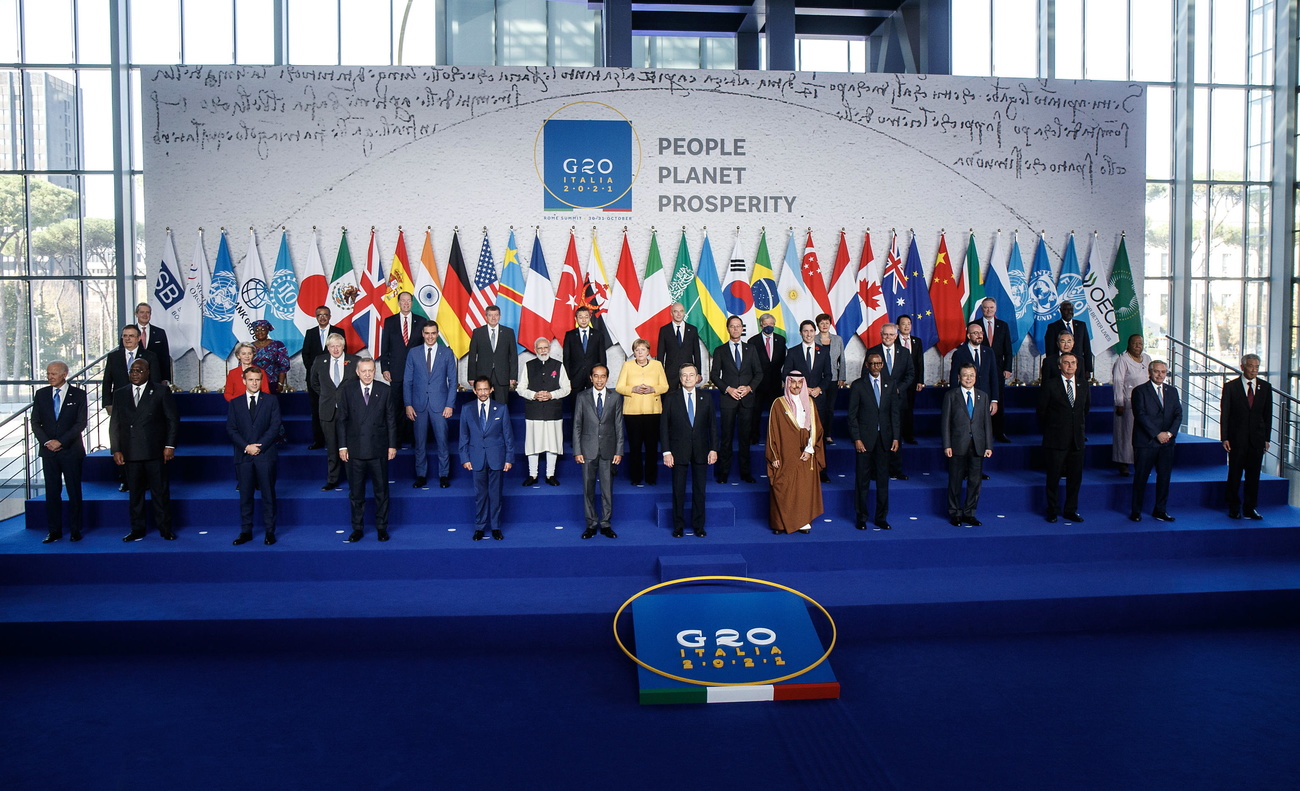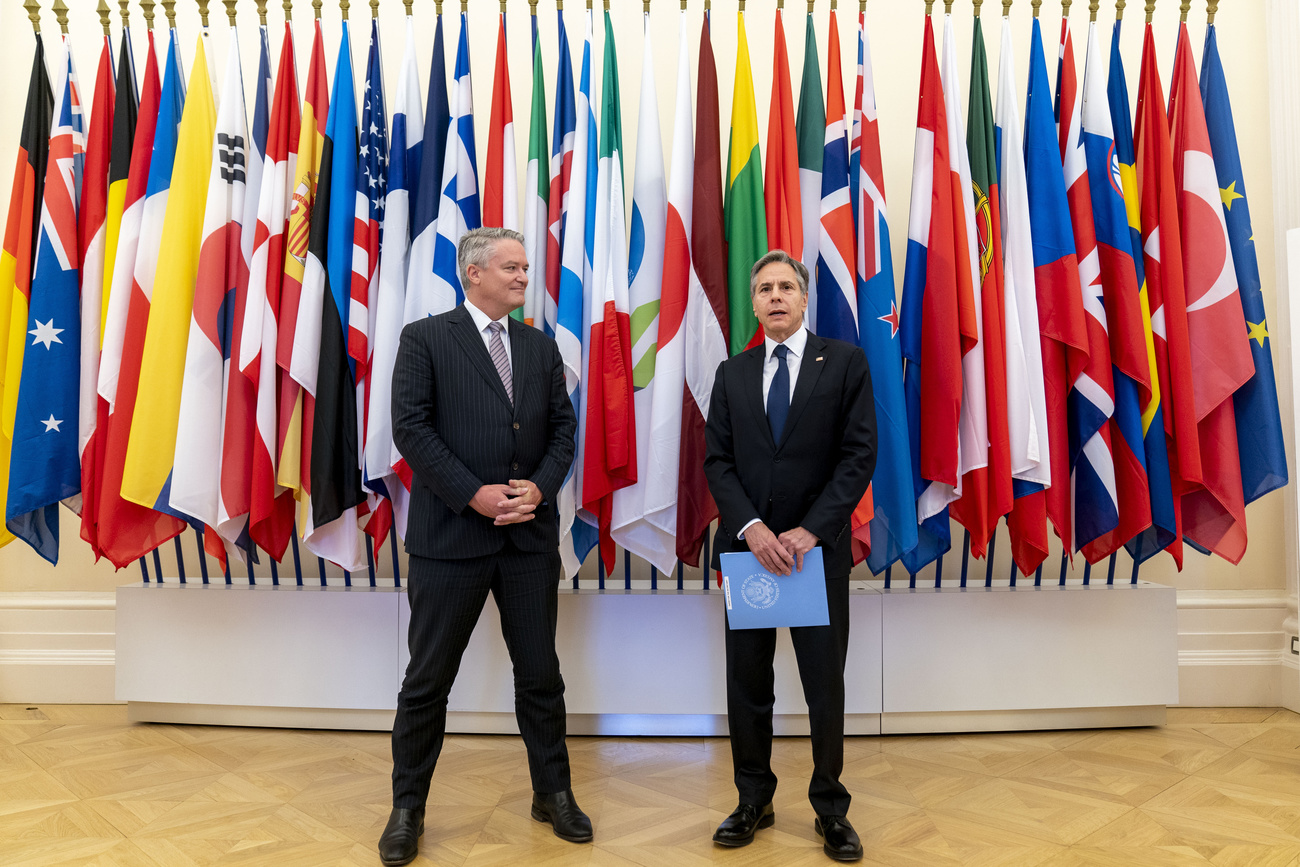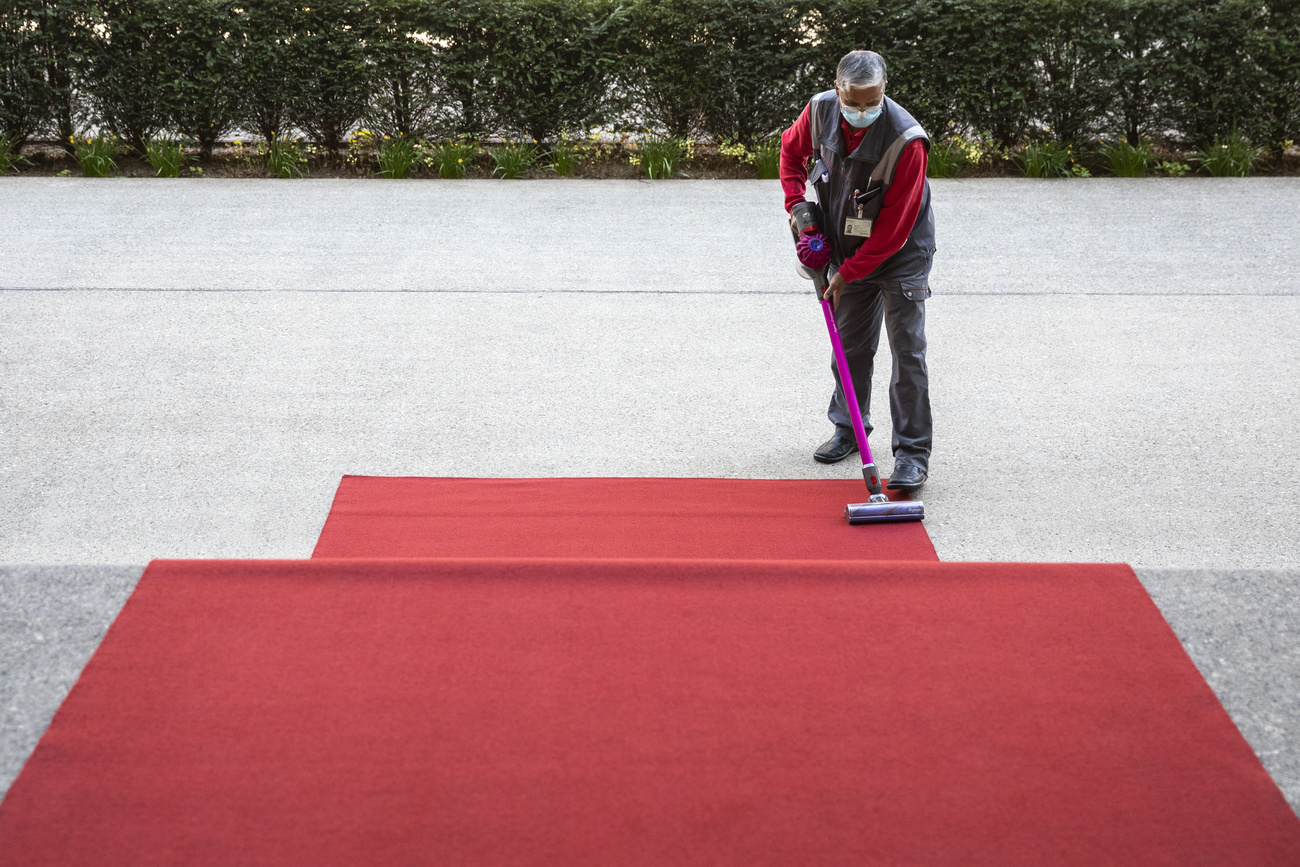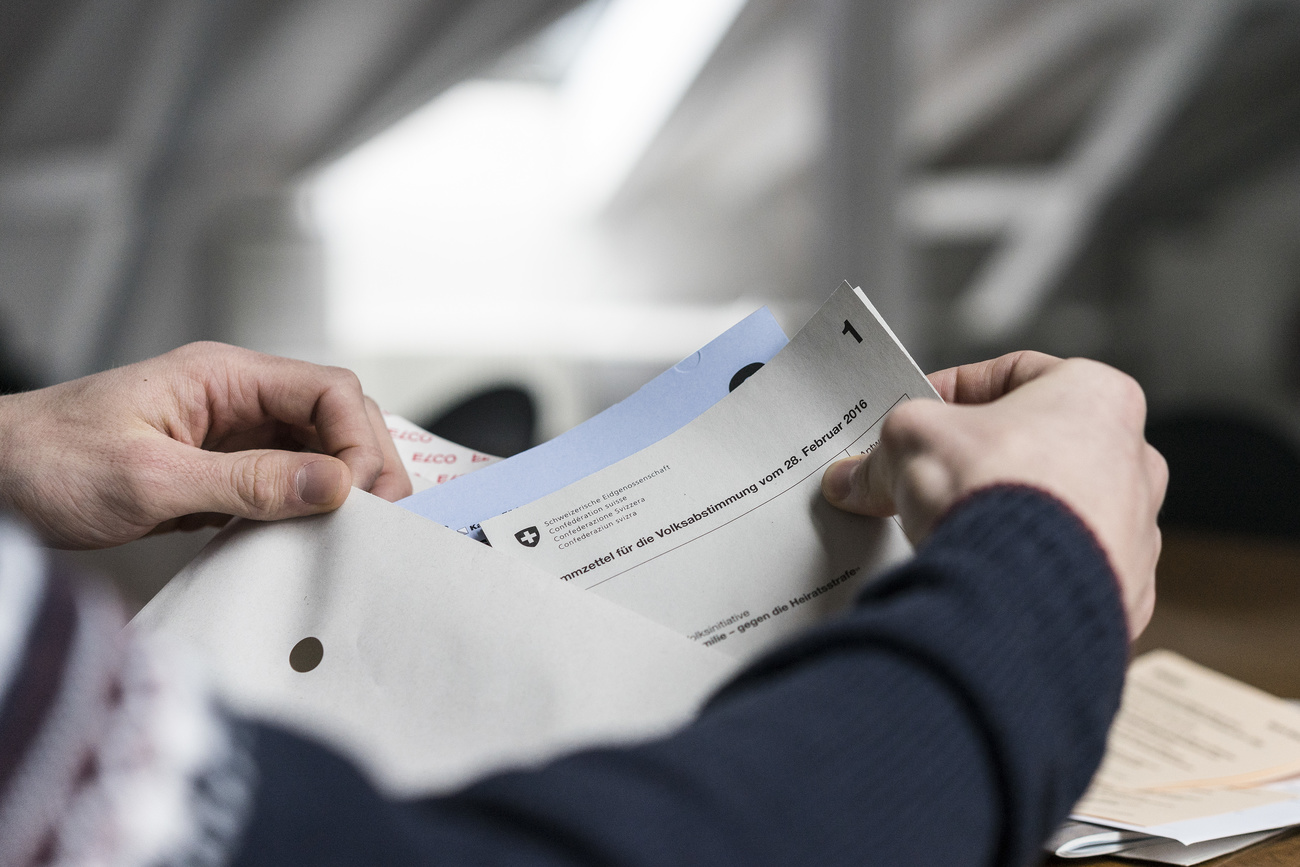
Global corporate tax deal reshapes how Switzerland attracts multinationals

The global corporate tax deal, rubber stamped by G20 heads of state at the end of October, won’t end tax competition but it will look different. This could play to Switzerland’s advantages.
Last summer, when clinical trials were still underway for its Covid-19 vaccine, Moderna set up its first “regional hub” outside the United States in the Swiss city of Basel. It was a coupExternal link for Switzerland, which is trying to attract innovative companies, especially in the life sciences sector.
According to a leaked contractExternal link signed last year, European Union payments for pre-ordered Moderna vaccine doses would be made to the Basel subsidiary – outside the EU.
While the company’s strong Swiss investor base and its partnership with Swiss company Lonza were key factors in the decision, the tax system was likely an added incentive. The Basel City canton’s corporate tax rate is 13%, whereas the averageExternal link rate globally is around 24%. The Basel rate is even less if deductions for research expenses and patent income are included.
It’s not unusual to use the tax system to woo companies onto a country’s soil. It’s also something that won’t change with the global corporate tax dealExternal link agreed by 136 countries including Switzerland.

More
Switzerland backs landmark OECD corporate tax agreement
“The biggest achievement of the global tax deal is getting so many countries to agree,” says Daniel Bunn from the Tax Foundation, a US-based thinktank. “If the project was meant to actually end tax competition, it certainly won’t achieve that.”
Nearly a decade in the making, the global corporate tax deal finalised by the Organisation for Economic Cooperation and Development (OECD) on October 8 and endorsed by G20 heads of state in Rome on October 30 has been hailed as an overhaul of the international tax system. In addition to redistributing some profits so companies pay more where they actually do business, the plan aims to make it harder for companies to avoid paying taxes by setting a 15% minimum corporate tax rate.
Swiss industry groups argue the deal is a blow to Switzerland’s competitiveness. But exceptions and carve outs – made larger in the weeks leading up to the final deal – ensure small, rich countries like Switzerland and Ireland, another country with favourable tax policies, don’t lose out on innovative companies like Moderna. Under the final deal, Switzerland will still be able to attract multinationals but for different reasons.
Tough sell
Switzerland’s reputation as a tax haven has undergone a makeover in the last decade. After a nationwide vote in 2019, the country did away with special tax perks and privileges for certain firms. This led cantons, which set their own rates, to adjust their corporate tax rates. The Basel rate went from 20.1% to 13%.
“If the country was at some point clearly a tax haven, it’s perhaps less so now,” says Bunn. This didn’t keep US President Joe Biden from calling it one a few months ago. The average statutory tax rate in the country is 14.9% but 18 of Switzerland’s 26 cantons levy less than that. At the lower end is canton Zug – with a population of 130,000 – which is home to big multinationals like Glencore and foreign subsidiaries of groups like Johnson & Johnson and Siemens.
On the surface, the deal has been a tough sell in Switzerland, which backed the deal with reservations in July. At the time, the Swiss finance ministry stressed that “the interests of small innovative countries must be explicitly taken into account in the final formulation of the rules”.
Martin Hess, who leads taxation at the industry association Swissholdings, told SWI that with the “increase in the tax burden, Switzerland is no longer that attractive from a tax rate perspective and Switzerland is and will remain a high-cost country”.

More
Switzerland fears impact of minimum corporate tax rate
This was reiterated by Dieter Wirth, who leads PwC Switzerland’s tax services and is involved in a working group advising the Swiss government on the deal. “Tax is not the only factor for competition but it’s still one factor and it’s a positive factor compared to other negative factors, which is the high salary environment.”
Carving out the pie
But groups like Oxfam argue that steps to assuage these concerns have diluted the deal and left loopholes that favour rich countries like Ireland, Singapore, and Switzerland.
“It would have been more acceptable if it was a genuine 15%,” Christian Hallum, a tax policy coordinator at Oxfam in Denmark told SWI. “Especially toward the end (of the discussions) we saw an expansion of loopholes that allow some companies to pay far below the 15%. We have a floor that is too low and a massive exception that will allow them to pay much less.”
The exception is the “substance carve outs” that allow companies with physical assets like buildings and employees in a country to reduce their tax base. This is intended to differentiate between real business activity and simply profit shifting, which makes it a positive tool, says Mona Baraké, a postdoctoral scholar at the EU Tax Observatory, an independent research centre housed in the Paris School of Economics with EU funding. However, it also reduces a company’s tax burden.
This helps the competitiveness of places like Switzerland and Ireland where multinationals have physical offices and people employed in contrast to low or no-tax jurisdictions like the Cayman Islands.
These carve outs were made more generous in the final agreement. In the July version of the deal, it amounted to a deduction in profits equal to 5% of the value of physical assets and payroll (salaries) in each country. In the final deal, this was increased to 8% and 10% respectively. It then drops to 5% over a 10-year transition period. In a simulation model, the EU Tax ObservatoryExternal link estimates that Switzerland’s tax revenue would drop from €7.5 billion (CHF7.9 billion) to €5.9 billion with the carve out in year 1. Switzerland’s high salaries could also mean a higher carve out.
The EU Tax Observatory writesExternal link that the message this sends is that no tax rate is considered too low as long as firms book profits in the countries where they own capital and employ workers. For example, a company with €1 billion in assets in a country with a 0% corporate tax rate, which makes €50 million in profit there, would still be subject to no tax at all.
While it may not have been OECD’s intention, says Hallum from Oxfam, this creates an incentive to shift profit. “The OECD seems to be saying to companies that if you have a local presence it’s no longer harmful anymore [to shift to a low tax jurisdiction].” He argues this puts poorer countries, that rely more heavily on corporate tax revenue, at a disadvantage as companies will still look for ways to pay less than 15%.
Baraké adds that it “may cause some companies to inflate the amount of assets and employees or move some people and assets to low tax countries like Switzerland because they can use the carve out” to lower their tax rate below the minimum. It’s also still not entirely clear what constitutes “real business activity” in a country to qualify. Activities in R&D are easier to move around and to inflate than a manufacturing site for example.
The intangibles
There are other aspects of the deal that gives Switzerland room to maneouver, says Bunn, because it doesn’t require countries to repeal certain practices.
One of those is special tax incentives for intellectual property such as patents and R&D tax credits that aim to spur innovation. Switzerland is among 15 European countries that have a patent box regimeExternal link, which lowers the effective tax rate on income from patents. According to one estimateExternal link, a patent box lowers the tax rate to 10% in some cases in Switzerland. This is particularly attractive to pharmaceutical companies that generate royalties from licensing patents.

More
Fight over rights to Covid-19 drugs puts Switzerland in a tough spot
Pascal Saint-Amans, director of the OECD Centre for Tax Policy and Administration, confirmed to SWI in a written statement that “companies can still have patent boxes and other tax benefits, but companies will need to pay the tax differential if the effective tax rate goes below 15%”. The benefits of the lower rates are therefore “neutralised”, said Saint-Amans.
In other words, the difference between the 10% with the patent income deduction and the 15% minimum still needs to be taxed. Hess from the industry group Swissholdings views this as a strike against Switzerland because the patent deduction can’t be used as a tax incentive, which he argues could also harm innovation.
Oxfam sees the situation differently though. “What concerns us is that companies will plan tax affairs that make use of a patent box or other ways to lower their taxes in one jurisdiction but then make sure they have enough tangible assets to use the substance carve out so that they can still pay less than 15% overall,” says Hallum. “What we fear is that this has opened the box for a new type of tax planning.”
Bunn echoes some of these sentiments. “I don’t want to be so cynical to say it’s all a game, but it’s pretty close to it and the rules are changing and when the rules change, the way the players play the game changes,” says Bunn. “If the new general effective tax rate is 15%, then there’s a reason for companies to try to find 15% wherever they are, even in a high tax country.”

More
Global tax deal approval ‘to take at least a year’, says president
This kind of gaming the system is why New York University professor Aswath Damodaran says that focusing on the tax rate misses the big picture. “Governments around the world don’t think the tax system is an instrument to collect more revenue. They use the tax code to reward what they perceive to be good behavior and punish what they classify as bad behavior and that’s a problem,” he told SWI.
Uncertain future
Swiss finance minister Ueli Maurer has toned down concerns about the deal, saying in early October that “ultimately the adjustments will not be as big as we had feared”. In addition to the carve outs, countries agreed to stick with 15% rather than previous proposals of “at least 15%”.
While details on implementation are still to be worked out, only companies with global revenue of €750 million ($867 million) will have to comply with the 15% tax rate according to the OECD threshold. The finance ministry estimates this will affect 200 companies headquartered in Switzerland and a couple thousand subsidiaries of foreign companies.
The other part of the deal to redistribute profits has a higher threshold and will likely only affect the biggest multinationals like Nestlé, Novartis and Roche. The deal, therefore, doesn’t affect small and medium-sized companies, which represent 99% of companiesExternal link in the country. The banking and mining sectors are also excluded from the deal.
Although the deal’s impact may be more limited than expected, there are still fears of ripple effects, especially in industries like pharmaceuticals, that represent nearly half of Swiss exports. “Switzerland is going to have to reinvent the wheel to stay attractive,” says Hess.
Correction: Switzerland’s tax revenue would drop from €7.5 billion (CHF7.9 billion) to €5.9 billion with the carve out in year 1. A previous version of this story incorrectly stated millions.
More

In compliance with the JTI standards
More: SWI swissinfo.ch certified by the Journalism Trust Initiative




























You can find an overview of ongoing debates with our journalists here . Please join us!
If you want to start a conversation about a topic raised in this article or want to report factual errors, email us at english@swissinfo.ch.